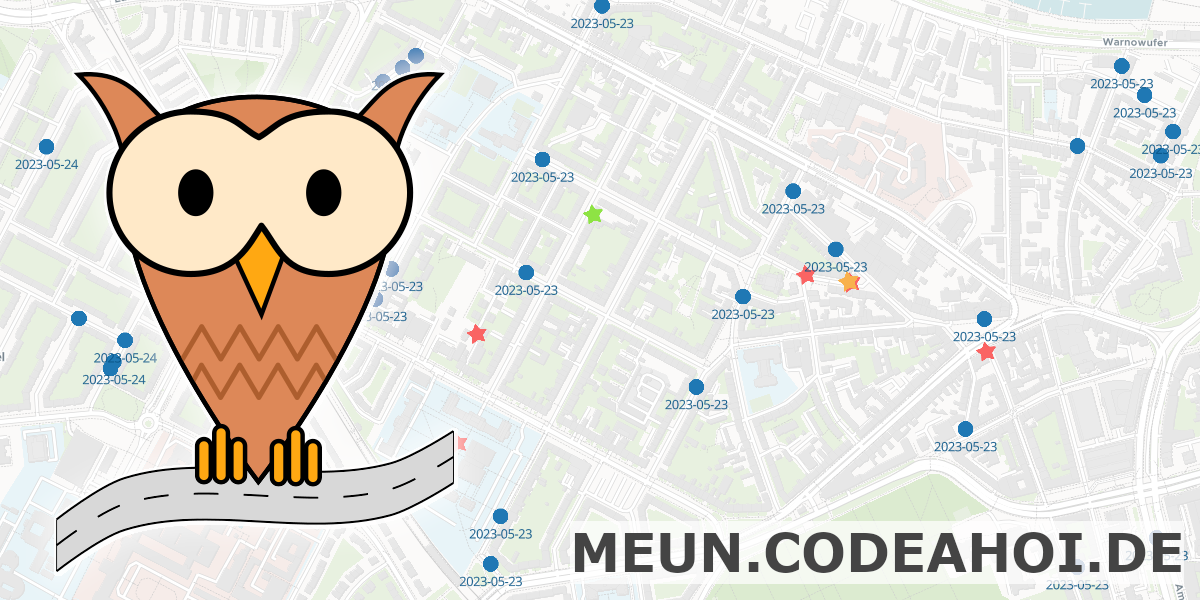MEUN
Last year, I participated in the Advent of Code challenge and used that opportunity to dig a bit into the Rust universe. That was quite a morish adventure, and to continue on that journey I was looking for small but practically “problems” that can be solved using rust. Under the supervision of an artificial and a natural intelligence, it all started with text recognition in images, followed by a lot of parallel computing (which is really nice in rust!), crawlers, web services, a bit of web assembly, etc…
And accidentally, half a year later a usable tool emerged:
MEUN: Rostock’s largest furniture exchange and upcycling network.
On an interactive map at meun.codeahoi.de users can find all kinds of gems in urban regions, such as Sperrmüll (eg. old furniture or e-waste) and places to share books and clothes. Currently, MEUN focuses on the Rostock region, but there is no technical limitation – it’s simply the region I’m most familiar with ;-)
Technical highlights
MEUN stores it’s data in a PostgreSQL, extended with PostGIS for support with geographic data. The backend service is written in Rust using the Axum framework. Users can register with an email address - there are no passwords in the classical sense. If you register or if you want to login MEUN will send a random one-time password per email, which is valid for an hour. Sessions are realised using axum_sessions. However, the whole “platform” is designed to not require any logins. You can just open MEUN and start browsing through points of interest and create new ones if you discover gems in your urban digressions.
The background vector tiles come from Maptiler. I also use other Maptiler features, such as the coordinate-to-address lookup. MEUN’s PostGIS map data is served by Tegola. The frontend is developed in Angular. The map is integrated using ngx-maplibre-gl and the client state is managed with Elf.
Finally, I need to emphasise that I did not realise all that alone.
I never did something useful with Rust before and I haven’t had much experience with geographic information systems (GIS), so I’m really that I received a lot of help by ChatGPT!
Not only with the programming, but also with wording and brainstorming and even the acronym.
Without ChatGPT, I would never have thought of building “Rostock’s largest furniture exchange and upcycling network!” ;-)
In addition, I received similarly important supervision by my non-AI friend and Rust expert Martin!
I learnt a lot and had tons of fun with my friends. And maybe you find that tool useful as well?
If you have cool ideas on how to improve/extend it or if you find other use cases for such a GIS platform, please let me know. Here as a comment, via email, or through the comment feature on MEUN.
- javascript (16) ,
- rust (1) ,
- software (161) ,
- application (2) ,
- website (22) ,
- web (86) ,
- ai (1) ,
- postgres (1)
- codeahoi (2) ,
- chatgpt (1) ,
- dall-e (2) ,
- stable diffusion (1) ,
- rust (1) ,
- angular (1) ,
- axum (1) ,
- postgis (1) ,
- tegola (1) ,
- maptiler (1) ,
- media (61) ,
- network (81) ,
- search (5) ,
- programming (75) ,
- private (31) ,
- web (8) ,
- gis (1)


Leave a comment
There are multiple options to leave a comment: